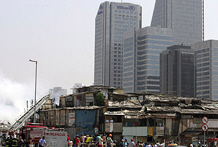
Typical street scene in Santa Ana, El Salvador. (Photo: iStock)
IMF Survey: Skills Key to Adapt to Globalization
October 10, 2007
While strong economic growth has made most people better off in absolute terms, globalization is often blamed for the widening gap between rich and poor.

Slums dwarfed by modern skyscrapers: technological advances have helped widen income inequality across the world (photo: Paulo Whitaker/Reuters).
IMF analysis
But new IMF research shows that the biggest culprit is in fact technological change. This is the one of the main findings of a chapter entitled "Globalization and Inequality," which is part of the IMF's October 2007 World Economic Outlook (WEO).
"We need to be careful with this point," said the IMF's Chief Economist Simon Johnson at a press briefing on October 10, "because the spread of new technology has also boosted growth. Thus, this is a tide that has raised all boats, but it has not raised all boats equally. In particular, more of the benefits have generally gone to people who are better educated. Financial globalization—including foreign direct investment—is also associated with rising inequality, largely because it facilitates the adoption of new technology," Johnson added.
"The implication, of course, is not to pull back from the adoption of new technology nor to erect new barriers to foreign direct investment. Any kind of protectionism would surely undermine the sustained growth that has raised global living standards. Rather the policy aim should be to help—including through better access to education and affordable health care—to ensure that as many people as possible participate in the opportunities that technological progress and globalization create," Johnson stated.
The three analytical chapters of the WEO were released on October 9. The IMF's forecasts for global growth will be released on October 17.
Read articles about the three chapters:
Technology widening rich-poor gap
Florence Jaumotte, Subir Lall, Chris Papageorgiou, and Petia Topalova
Contrary to common belief, the expansion of global trade has helped reduce inequality rather than increase it—particularly in developing countries where agriculture still employs a large share of the workforce. In contrast, financial globalization has led to rising inequality, mainly because those with higher skill levels have been better able to take advantage on the benefits of foreign direct investment.
To help distribute the gains of globalization more evenly, the IMF points to the need for better access to education for low income groups around the world. Broadening access to finance among low-income groups could also help improve the distribution of income.
Learning how to cope with capital inflows
Roberto Cardarelli, Selim Elekdag, and M. Ayhan Kose
The October 2007 WEO also takes a critical look at capital inflows. The wave of capital flows sweeping through many emerging market economies since the early 2000s is potentially a double-edged sword. On the one hand, it provides opportunities for long-term growth. On the other hand, it presents policymakers with macroeconomic challenges.
This chapter, entitled "Managing Large Capital Inflows," concludes that the most effective tools policymakers have at their disposal to avoid overheating and output instability are fiscal restraint—avoiding any abrupt increases in spending when capital flows are peaking—and exchange rate flexibility
Martin Sommer and Nikola Spatafora
In "The Changing Dynamics of the Global Business Cycle," IMF researchers ask whether the world has entered a new period of high and stable growth akin to the golden age of the 1960s or whether we are just experiencing some prolonged good luck.
They find that improvements in the conduct of monetary and fiscal policy and stronger institutional frameworks have resulted in higher and more sustainable growth. And because these changes are structural in nature, the IMF expects output volatility to remain low in the future.
Of course, that does not mean stability can be taken for granted. Low average volatility does not rule out occasional recessions, and trade and financial globalization has created new vulnerabilities. Recent losses associated with the U.S. subprime mortgage market serve as a useful reminder of the risks lurking in the new economic and financial landscape. It is important that policymakers identify new risks as they emerge, and respond promptly.


